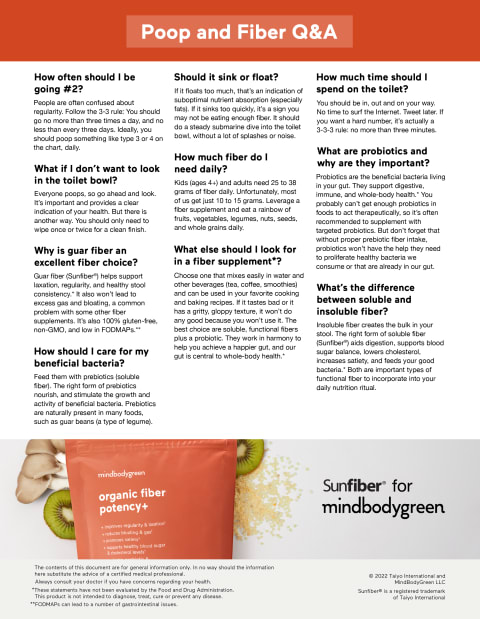Luckily, diet and lifestyle are often to blame, which means small and consistent changes can make a big difference in the health of your stool. Here, we’ve outlined a number of strategies you can try out to help promote regularity and teach your body how to poop better and easier. “Fiber helps promote digestive regularity, which is good for the gut. Soluble fiber, in particular, helps build stool bulk, while insoluble fiber helps speed up transit time,”* explains registered dietitian and mbg Collective member Jess Cording, M.S., R.D., CDN. According to the National Academies, the daily nutritional requirement for dietary fiber is at least 21 grams of fiber per day for women (and an additional 3-4 grams if they’re pregnant or breastfeeding, respectively) and at least 30 grams per day for men. This hefty daily fiber need takes some real intention and a plant-plentiful dietary approach. To up your fiber intake, Cording recommends including a combination of soluble fiber (e.g., beans, lentils, oat bran, nuts, seeds, fruit, and some vegetables) and insoluble fiber (e.g., wheat bran, whole grain products, and vegetables) to your daily meals. “If you’re working on increasing your fiber intake, do so gradually, and increase your fluid intake as well to help keep things moving through the GI tract,” she suggests. “For digestive comfort, spread your fiber intake throughout the day, aiming to have at least one high-fiber food per meal.” Adding a high-quality fiber supplement (like mindbodygreen’s organic fiber potency+) to your daily routine can also help you and your family achieve daily fiber needs. This plant-powered fiber powder delivers a versatile, USDA certified organic blend of soluble and insoluble fibers (for a total six grams of dietary fiber) from organic guar bean, a mushroom trio (reishi, maitake, oyster), and green kiwifruit all the way from New Zealand, plus a targeted Bacillus subtilis probiotic strain for incremental benefits. Together, these ingredients support regularity, gut motility, healthy bowel movements, and all-around stellar gut health.* RELATED: How Much Fiber You Need Per Day + How To Increase Your Intake To promote a healthy evacuation, your morning may include drinking an entire glass of water upon waking and a smoothie rich in healthy fats and fiber. You might follow this up with some stretching or aerobic movement, more hydration, and start sipping on some coffee while getting ready. And while that morning scenario is broad (please, personalize for your life!) and everyone’s poop timing and cadence is unique, the point is that our bodies crave routine, and that can definitely look like nutrient-dense eating, plenty of water, physical activity, and more (because these healthy lifestyle strategies help move stool through your colon and on out). For example: In a 2019 Food Science & Nutrition review, researchers found that ginger root has gastroprotective properties and helps support GI motility. According to a recent review from The American Journal of Chinese Medicine, botanicals like rhubarb, senna leaf, and aloe also have polyphenols that help promote regularity. That doesn’t mean you need to hit the gym every day to poop better, but consider adding some yoga, walking, or light core work into your daily routine. Thankfully, deep breathing exercises can help relieve stress and, in turn, support digestion. Diaphramatic breathing in particular (also known as deep belly breathing) may especially help with digestive health. Dietary magnesium inputs (whole grains, nuts, seeds, and fish) can be complemented with a magnesium supplement as needed. This multifaceted mineral aids in muscle and nervous system relaxation, and magnesium citrate can be particularly beneficial for your trips to the bathroom. That said, you should always speak to your health care provider about incorporating new supplements into your regimen, as well as your digestive goals and progress.




